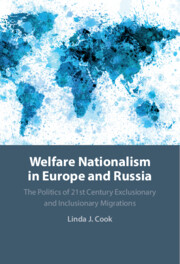
- Publisher:
- Cambridge University Press
- Online publication date:
- November 2024
- Print publication year:
- 2024
- Online ISBN:
- 9781108891202

What is the relationship between the expansion of international labour migration, informal and precarious employment, and growing nationalism? Welfare Nationalism compares 21st century MENA migrations to Europe and Russia, the Ukrainian refugee migration to Europe in 2022, and labor migrations from Central Asia to Russia and from Central and Eastern Europe to Britain. Linda Cook contends that exclusionary and inclusionary migration cycles exist in both regions, driven by the 'deservingness' of migrants and mobilized by anti-immigrant politicians. Arguing that the long-term deterioration of labor markets and welfare provision for nationals in Europe and Russia drives welfare nationalism, she shows how populist parties in Europe and sub-national elites in Russia thrive on scapegoating migrants. Featuring a unique comparative analysis, this book examines the increasing harshness of contemporary migration policies and explores how we have arrived at the daily stand-offs of desperate international migrants against Europe's powers of surveillance and enforcement.
‘Linda Cook’s book is an insightful analysis of the combination of welfare nationalism, international migration, and who is included and excluded from the benefits of the European welfare states. The book is timely because flows of migrants to Europe, driven by different external events, shows no sign of subsiding anytime soon. The book’s sad conclusion that the major criteria for including migrants into receiving states welfare provision is cultural proximity is saying the quiet part out loud.’
Timothy Heleniak - Senior Research Fellow, Nordregio
‘In this compelling and meticulously researched book, Linda Cook skilfully dismantles conventional perspectives on welfare and migration. From the vulnerabilities of labour migrants to the MENA crisis and the Ukrainian refugee wave, the narrative unveils Europe's contrasting responses. A compelling exploration of cultural proximity, 'Europeanness,' and the urgent need for reform. A must-read for anyone seeking profound insights into the complexities of today's migration landscape.’
Agnieszka Kubal - Associate Professor in Sociology, SSEES, UCL
‘This broad study of welfare nationalism in Europe and Russia makes it convincingly clear that growing international migration is a major political challenge for national governments. Cook’s exploration of exclusionary and inclusionary migrations is crucial for our understanding of current political developments. Her wide-ranging case studies exemplify significant political implications of ‘vicious’ and ‘virtuous’ cycles of public opinion. An inspiring and important contribution to the study of international migration and welfare.’
Stein Kuhnle - Professor Emeritus of Comparative Politics, University of Bergen
‘A fascinating and original study on exclusive and inclusive migration policies in Russia and Europe that illustrates how much more difficult it is for migrants from the Middle East to integrate European societies compared to Ukrainian migrants to Europe or post-Soviet migrants to Russia.’
Marlene Laruelle - The George Washington University
‘In this impressive comparative study, Linda Cook tackles an urgent but painful problem in our age of mass migration and welfare state retrenchment: the increasing tendency of governments to confine access to lawful immigration and social welfare benefits only to immigrants from culturally similar societies. A particular strength of the volume is the inclusion of Russia, showing that this tendency applies across both democratic and authoritarian regimes. Cook’s closing reflections on the future of lawful international migration suggest that although more humane approaches to mass migration are possible, contemporary Global North governments have settled on a course of repressive interdiction that seems likely to lock more and more immigrants into a precarious, insecure existence.’
Matthew Light - Associate Professor of Criminology and European Studies, University of Toronto, Canada
‘A comprehensive and readable treatment of recent immigration attitudes, Cook weaves together cases from across Europe, from the UK to Russia, to demonstrate how ethnic closeness (i.e. racism), threat perception, and other factors play a key role in host country and society's willingness to accept immigrants. By adding Russia to the typical European stories of populism and anti-immigrant nationalism, Cook extends the analysis to show similar forces are at work across democratic and authoritarian states. This exceptionally accessible volume is a welcome addition to discussions on the politics of migration and national identity.’
Caress Schenk - Associate Professor and Chair, Department of Political Science and International Relations, Nazarbayev University
‘This essential book demonstrates the importance of understanding state responses to international migration, in its multiple forms, as fundamental to the restructuring of welfare. Through a series of detailed case studies, in Europe and Russia, Cook not only shows the variegated nature of these responses but provides a rigorous explanation in terms of the rise of welfare nationalism, racism, and populism, in some cases, and a solidaristic extension of social rights to those aligned culturally with the receiving country, in others. In the process, Cook asks searching questions about hierarchies of deservingness and undeservingness, as well as outdated classifications of migrant types. She makes a strong plea for a more humane, rational, and consistent response to all migrants. The book is an exemplar of what a comparative approach can bring and serves as a model for similar studies in the future.’
Paul Stubbs - Senior Research Fellow, The Institute of Economics, Zagreb, Croatia
‘With ‘welfare nationalism’ and ‘welfare deservingness’ as its central concepts this book analyzes how, in the past two decades in European countries and Russia, dynamic politics of labor and welfare rights shape the social inclusion and exclusion of a variety of migrant groups. Vital reading for anyone interested in the highly saliant question of which migrant outsiders are seen as deserving inclusion in our societies, and which are not?’
Wim van Oorschot - Professor Emeritus of Social Policy, KU Leuven, Belgium
 Loading metrics...
Loading metrics...
* Views captured on Cambridge Core between #date#. This data will be updated every 24 hours.
Usage data cannot currently be displayed.